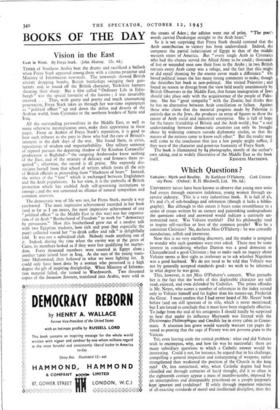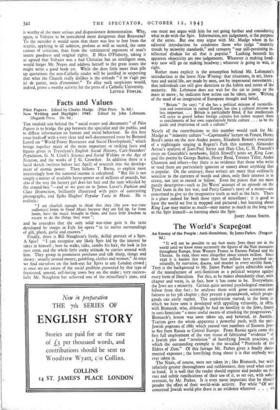Which Questions ?
Voltaire : Myth and Reality. By Kathleen O'Flaherty. Cork Univer- sity Press. (Oxford : B. H. Blackwell, Ltd. 10s. 6d.) UNIVERSITY tutors have been known to observe that young men write bad essays through excessive indolence, young women through ex-
cessive industry. This is a very industrious book. It is full of a's, b's and c's, of sub-headings and references (though it lacks a biblio- graphy). But although to this extent it bears some resemblance to a series of essays written by an earnest and painstaking undergraduate the questions asked and answered would indicate a curiously un- instructed tutor. Was Voltaire truthful? Did his philosophy tend to inspire self-sacrifice or love of the common people? Was he a consistent Christian? No, declares Miss O'Flaherty : he was cowardly mendacious, selfish and irreverent.
Now this is no very startling discovery, and the reader is tempted to wonder why such questions were ever asked. There may be some interest in considering whether Danton was a good democrat or Chateaubriand a good Christian ; but to make such an inquiry about Voltaire seems at first sight as irrelevant as to ask whether Napoleon was a. good husband. We do not need to be told that Voltaire was not by generally accepted standards good : we wish to be informed in what degree he was great.
This, however, is not Miss O'Flaherty's concern. What perturbs her is the fact that the works of this deplorable character are still read, enjoyed, and even defended by Catholics. The prime offender is Mr. Noyes, who scores a number of references in the index second only to Voltaire himself and far higher than his runner-up, Frederick the Great. I must confess that I had never heard of Mr. Noyes' book before (and am still ignorant of its title, which is never mentioned) but I am forced to conclude that it must have been singularly effective. To judge from the zeal of his antagonist I should hardly be surprised to hear that under its influence Maynooth was littered with the Dictionnaire Philosophique and Candide lay in every cabin in Conne- mara. A situation less grave would scarcely warrant 15o pages de- voted to proving that the sage of Ferney was not persona grata to the Vatican.
Yet, even leaving aside the central problem : what end did Voltaire wish to encompass, why, and how far was he successful: there are many subsidiary questions to which a Catholic answer would be interesting. Could it not, for instance, be argued that in his challenge, compelling a general inspection and resharpening of weapons, rather strengthened than weakened the position of the Church in the long run? Or, less conjectural, why, when Catholic dogma had been chiselled out through centuries of lucid thought, did it so often in the eighteenth century appear a mass of mumbo-jumbo, imposed by an unscrupulous and disreputable priesthood on a people purposely kept ignorant and credulous? If solely through impatient rejection of all-exacting standards of moral and intellectual discipline, then this is worthy of the most serious and dispassionate demonstration. Why, again, is Voltaire to be considered more dangerous than Rousseau? To the outsider it would seem that there was less to fear from the sceptic, applying to all subjects, profane as well as sacred, the same canons of criticism, than from the sentimental exponent of man's innate goodness and original rights. If Miss O'Flaherty, taking it as agreed that Voltaire was a bad Christian but an intelligent man, would forget Mr. Noyes and address herself to the great issues she might write a good book yet. While she does little more than pile up quotations the non-Catholic reader will be justified in suspecting that what the Church really dislikes is the attitude " it ne s'agit pas ici de parier, mais d'examiner." To allay such suspicions would, indeed, prove a worthy activity for the press of a Catholic University.
LErrac.E FOWLER.



























 Previous page
Previous page